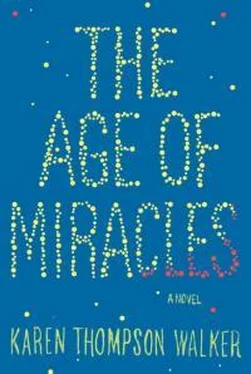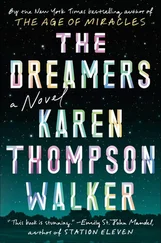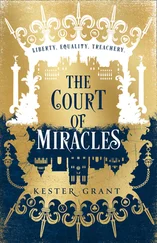Seth was the last one onto the bus. He smiled a weak smile as he passed me, heading as usual for the back rows. What I saw in his face was more alarming than what I’d seen in Daryl’s. In Seth’s dark eyes and his thick, pressed lips, I saw something different, something worse: I saw pity.
I considered running off the bus right then, but it was too late. The doors were closing.
“I bet they’re already sending the president and the smartest scientists to the space station, where they’ll be safe,” said Trevor from the front seat, as if his stream of theories had never been interrupted. For once, I was glad that he was talking.
The bus jerked away from the curb. The driver, a fat man in a thick black belt, looked rattled and distracted. He kept glancing up through the windshield at the sun.
I reached for my necklace, and that was when I noticed it was gone, my grandfather’s tiny gold nugget, flung somewhere in the dirt.
I turned to Michaela, panicked. “My necklace,” I said. “Where’s my necklace?”
But Michaela didn’t hear me. She was already involved in a conversation on her phone.
“I’m telling you,” said Trevor. “This is Armageddon.”
At school, we were told to disregard the bells, now rogue, the whole bell system having come unhooked from time.
Without the morning bell to prod us, we turned aimless and imprecise. Kids floated this way or that, a shifting flock of birds. The crowd was wilder than usual, harder to herd. We were loud and wound up. I hid out at the edge of the group while teachers tried in vain to corral us. Their thin voices were drowned out by the ocean of our own.
This was middle school, the age of miracles, the time when kids shot up three inches over the summer, when breasts bloomed from nothing, when voices dipped and dove. Our first flaws were emerging, but they were being corrected. Blurry vision could be fixed invisibly with the magic of the contact lens. Crooked teeth were pulled straight with braces. Spotty skin could be chemically cleared. Some girls were turning beautiful. A few boys were growing tall. I knew I still looked like a child.
By now, the fog had burned away, leaving a bright, clear sky in its place. The flags on the school’s flagpole were snapping and fluttering in the wind.
Through the crowd of kids out front, a potent rumor was wafting. These same channels had previously carried news of the illicit explorations of Drew Costello’s fingers and of the acrobatics of Amanda Cohen’s tongue, of the ziplock bag of marijuana found stashed in Steven Galleta’s backpack and, later, of the details of Steven Galleta’s life at the Mount Cuyamaca Camp for Troubled Boys. Amid this usual bilge now floated a different kind of gossip, its sources equally dubious: In 1562 a scientist named Nostradamus had predicted that the world would end on this exact day.
“Isn’t that creepy?” said Michaela, nudging me with her shoulder.
I was eager to escape. I wanted to burrow into the crowd, but I was afraid to leave Michaela’s side.
“I guess he was some kind of psychic or something,” she said.
You could still see the stretch marks on my T-shirt from the bus stop.
“Hey,” she said, looking around. “Where’s Hanna?”
“Utah,” I said. I could barely say the words. “Her whole family left right away.”
I pictured dozens of cousins sleeping in cars in the Utah desert, encircling a giant grain silo.
“Holy crap,” said Michaela. “Like forever?”
“I think so.”
“Weird,” she said.
Then Michaela asked to copy my history homework.
“I didn’t think we’d have school today,” she said. “So I didn’t do it.”
But I knew that Michaela had stopped doing her homework earlier that year. She was developing a different set of skills. There was a lot to learn about the care of hair and skin. There was a proper way to hold a cigarette. A girl wasn’t born knowing how to give a hand job. I let her see my homework whenever she asked.
In science, we made new sundials to replace the ones we’d made the first week of school. I was glad to be sitting in a classroom full of kids who had none of them been at the bus stop.
“Adaptation is a necessary part of nature,” said Mr. Jensen after he handed out the new calibrations for the sundials. He was folding and unfolding his hands as he talked. “This is all perfectly natural.”
We were struggling to jam toothpicks into mounds of wet clay. The trick was to insert the toothpick at exactly the right angle. It was already clear that most of our sundials would tell a useless, sloppy sort of time.
“Think of the dinosaurs,” he continued. “They died out because they couldn’t adapt to a changed environment.”
Mr. Jensen had a ponytail and a beard. He wore a lot of tie-dye. He rode a bike to school, and it was rumored that he cooked his meals on the Bunsen burners in the back of the classroom and slept in a sleeping bag under his desk. He wore hiking boots to school every day. He looked like he could live for many months in the desert with only a compass and a pocketknife and a canteen.
“But of course,” he added, clasping his hands together, “we’re very different from the dinosaurs.” I could tell he was hoping not to scare us, but that was the thing: We kids were not as afraid as we should have been. We were too young to be scared, too immersed in our own small worlds, too convinced of our own permanence.
Competing rumors held that Mr. Jensen was actually a millionaire or that he’d invented something important for NASA and taught science only for the love of teaching. He was my favorite teacher that year. I knew he liked me, too.
He set up a question-and-answer box that day so that we could ask anonymous questions about what was happening.
“There’s no such thing as a stupid question,” he said as he collected our scraps of paper in a converted Kleenex box.
This was the same box we had used on the day they separated the girls from the boys, and the nurse came to tell the girls about our futures. “Something very special is going to happen to you,” she had said slowly, like a fortune teller reading palms. “It comes from the Greek word for month , because it’s going to happen once a month, just like the lunar cycle.” Only Tammy Smith and Michelle O’Connor had sat apart, shifting knowingly in their seats, their bodies already in tune with the moon.
Now Mr. Jensen reached into the box and pulled out a question. He unfolded the piece of paper with great care: “ ‘Is it true,’ he read, ‘that a scientist predicted that the world would end today?’ ”
“Nostradamus wasn’t exactly a scientist,” said Mr. Jensen. He had evidently heard the rumor circulating the halls. “You all know that no one can predict the future. No one can say what will happen tomorrow, much less five hundred years from now.”
The school bell buzzed. But we all stayed put on our lab stools. The lunch bell was out of sync with us now.
Outside, the sky remained bright. Sunlight was pouring in through the windows, catching on the rows of clean beakers and clean test tubes, glittering like wineglasses on the shelves.
Mr. Jensen pulled another question from the box. Someone asked if the slowing might be caused by pollution.
This question seemed to depress him. “We don’t know yet why this is happening,” he said.
He took off his glasses and rubbed his forehead with the back of his hand. He paused near the fish tank, empty since September, when the filtration system abruptly stopped working. It happened on a weekend. We had returned Monday morning to find five fish floating like leaves on the surface. You could see the blood beneath the scales on their little bodies. The water looked clear to our eyes, but it had turned toxic for fish.
Читать дальше












